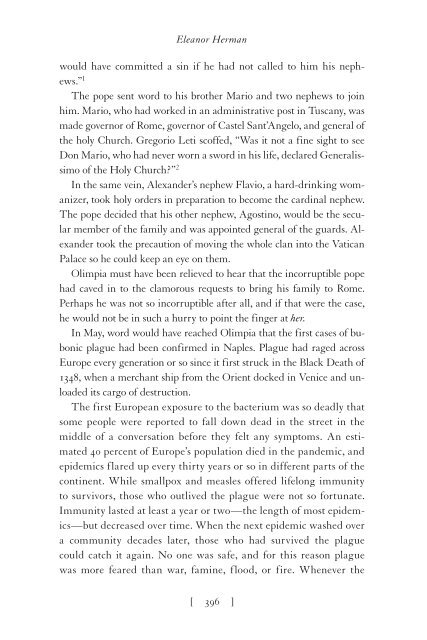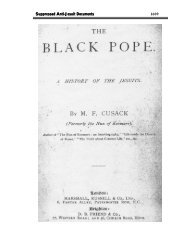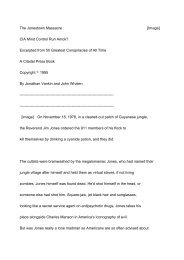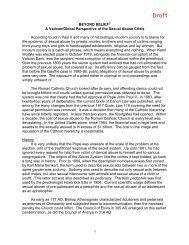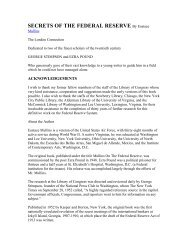- Page 3 and 4:
Mistress of the VAT I C A N The Tru
- Page 5 and 6:
Contents Acknowledgments v Introduc
- Page 7 and 8:
Acknowledgments One day in August 2
- Page 9:
Acknowledgments tress of Guardea ow
- Page 12 and 13:
Eleanor Herman The day that Cardina
- Page 14 and 15:
Eleanor Herman was carefully studie
- Page 16 and 17:
Eleanor Herman below the Seven Hill
- Page 19 and 20:
1 q The Convent O do not be born a
- Page 21 and 22:
Mistress of the Vatican burgher. Bu
- Page 23 and 24:
Mistress of the Vatican According t
- Page 25 and 26:
Mistress of the Vatican confusion a
- Page 27 and 28:
Mistress of the Vatican It was a fe
- Page 29 and 30:
Mistress of the Vatican sure she go
- Page 31 and 32:
Mistress of the Vatican Nuns were n
- Page 33 and 34:
Mistress of the Vatican ginity, and
- Page 35 and 36:
Mistress of the Vatican a girl like
- Page 37 and 38:
Mistress of the Vatican brutally, p
- Page 39 and 40:
2 q The Wealthy Landowner’s Wife
- Page 41 and 42:
Mistress of the Vatican sacrament o
- Page 43 and 44:
Mistress of the Vatican fiercely—
- Page 45 and 46:
Mistress of the Vatican loudly, “
- Page 47 and 48:
Mistress of the Vatican to behave h
- Page 49 and 50:
Mistress of the Vatican matters thr
- Page 51 and 52:
Mistress of the Vatican just the ri
- Page 53 and 54:
Mistress of the Vatican in installm
- Page 55 and 56:
Mistress of the Vatican Donkeys dra
- Page 57 and 58:
Mistress of the Vatican entered the
- Page 59 and 60:
Mistress of the Vatican and roofers
- Page 61 and 62:
Mistress of the Vatican each new de
- Page 63 and 64:
Mistress of the Vatican cheerfully
- Page 65 and 66:
Mistress of the Vatican of greater
- Page 67 and 68:
Mistress of the Vatican another. Th
- Page 69 and 70:
Mistress of the Vatican foot. When
- Page 71 and 72:
Mistress of the Vatican before him.
- Page 73 and 74:
Mistress of the Vatican disturb him
- Page 75 and 76:
Mistress of the Vatican candlelight
- Page 77 and 78:
Mistress of the Vatican area, each
- Page 79 and 80:
Mistress of the Vatican would be pr
- Page 81 and 82:
Mistress of the Vatican this came a
- Page 83 and 84:
Mistress of the Vatican See was vac
- Page 85 and 86:
Mistress of the Vatican such a deli
- Page 87 and 88:
Mistress of the Vatican impossible,
- Page 89 and 90:
Mistress of the Vatican Most Illust
- Page 91 and 92:
Mistress of the Vatican tives of eq
- Page 93 and 94:
Mistress of the Vatican Olimpia, th
- Page 95 and 96:
Mistress of the Vatican newly elect
- Page 97 and 98:
Mistress of the Vatican merit, rath
- Page 99 and 100:
Mistress of the Vatican And so Thei
- Page 101 and 102:
Mistress of the Vatican Luther stud
- Page 103 and 104:
Mistress of the Vatican the buildin
- Page 105 and 106:
Mistress of the Vatican When the co
- Page 107 and 108:
Mistress of the Vatican was his ill
- Page 109 and 110:
Mistress of the Vatican Protestant
- Page 111 and 112:
Mistress of the Vatican from two fl
- Page 113 and 114:
Mistress of the Vatican ready to ru
- Page 115 and 116:
Mistress of the Vatican It is hard
- Page 117 and 118:
Mistress of the Vatican that visito
- Page 119 and 120:
Mistress of the Vatican she could t
- Page 121 and 122:
Mistress of the Vatican slapping do
- Page 123 and 124:
Mistress of the Vatican to find tha
- Page 125 and 126:
Mistress of the Vatican States loan
- Page 127 and 128:
8 q Conclave No one takes this hono
- Page 129 and 130:
Mistress of the Vatican one prison
- Page 131 and 132:
Mistress of the Vatican Though supp
- Page 133 and 134:
Mistress of the Vatican The very fi
- Page 135 and 136:
Mistress of the Vatican count of Si
- Page 137 and 138:
Mistress of the Vatican Library, co
- Page 139 and 140:
Mistress of the Vatican Gianbattist
- Page 141 and 142:
Mistress of the Vatican Pamphili an
- Page 143 and 144:
Mistress of the Vatican Gabrielli.
- Page 145:
Part Two THE FEMALE POPE q
- Page 148 and 149:
Eleanor Herman VIII. But Roman wits
- Page 150 and 151:
Eleanor Herman horrifying Spaniard
- Page 152 and 153:
Eleanor Herman giving everyone test
- Page 154 and 155:
Eleanor Herman The guards who enter
- Page 156 and 157:
Eleanor Herman building was leaning
- Page 158 and 159:
Eleanor Herman be discovered in the
- Page 160 and 161:
Eleanor Herman rain, and sun. The s
- Page 162 and 163:
Eleanor Herman descended, the entir
- Page 164 and 165:
Eleanor Herman Contarini, reported
- Page 166 and 167:
Eleanor Herman Camillo be allowed o
- Page 168 and 169:
Eleanor Herman the Conservators, in
- Page 170 and 171:
Eleanor Herman the procession all t
- Page 172 and 173:
Eleanor Herman their drawings, thre
- Page 174 and 175:
Eleanor Herman load-bearing walls t
- Page 176 and 177:
Eleanor Herman this wing that Innoc
- Page 178 and 179:
Eleanor Herman could not visit pros
- Page 180 and 181:
Eleanor Herman Olimpia’s house be
- Page 182 and 183:
Eleanor Herman sister-in-law of His
- Page 184 and 185:
Eleanor Herman Yet in southern Ital
- Page 186 and 187:
Eleanor Herman warded when he becam
- Page 188 and 189:
Eleanor Herman was smart enough to
- Page 190 and 191:
Eleanor Herman present Innocent X w
- Page 192 and 193:
Eleanor Herman immediately. Nursing
- Page 194 and 195:
Eleanor Herman accounts were frozen
- Page 196 and 197:
Eleanor Herman against “the consu
- Page 198 and 199:
Eleanor Herman seems to be no rhyme
- Page 200 and 201:
Eleanor Herman Crete against invadi
- Page 202 and 203:
Eleanor Herman gasping and gesturin
- Page 204 and 205:
Eleanor Herman But Bernini’s flam
- Page 206 and 207:
13 The Despised Daughter-in-Law q B
- Page 208 and 209:
Eleanor Herman Ridolfi, general of
- Page 210 and 211:
Eleanor Herman What the French alre
- Page 212 and 213:
Eleanor Herman nephew. But Olimpia
- Page 214 and 215:
Eleanor Herman But there was Olimpi
- Page 216 and 217:
Eleanor Herman and the princess who
- Page 218 and 219:
Eleanor Herman pope wouldn’t let
- Page 220 and 221:
Eleanor Herman Most wealthy people
- Page 222 and 223:
Eleanor Herman had heard to be a yo
- Page 224:
above: Pope Innocent X by Diego Vel
- Page 227 and 228:
Pope Urban VIII, who made Giovan Ba
- Page 229 and 230:
above: Pope Alexander VII by Giovan
- Page 231 and 232:
Mistress of the Vatican Unable to t
- Page 233 and 234:
Mistress of the Vatican tried hard
- Page 235 and 236:
Mistress of the Vatican When Ambass
- Page 237 and 238:
Mistress of the Vatican Tommaso Ani
- Page 239 and 240:
Mistress of the Vatican Even more t
- Page 241 and 242:
15 Birth, Famine, and Bitter Peace
- Page 243 and 244:
Mistress of the Vatican described O
- Page 245 and 246:
Mistress of the Vatican Rome. They
- Page 247 and 248:
Mistress of the Vatican Vatican int
- Page 249 and 250:
Mistress of the Vatican an empty pu
- Page 251 and 252:
Mistress of the Vatican The palace
- Page 253 and 254:
Mistress of the Vatican treaty and
- Page 255 and 256:
16 The Shoulder of Saint Francesca
- Page 257 and 258:
Mistress of the Vatican skirmishes
- Page 259 and 260:
Mistress of the Vatican Her corpse
- Page 261 and 262:
Mistress of the Vatican intactness
- Page 263 and 264:
Mistress of the Vatican and governm
- Page 265 and 266:
Mistress of the Vatican collected f
- Page 267 and 268:
Mistress of the Vatican way up, as
- Page 269 and 270:
Mistress of the Vatican wrote to Ca
- Page 271 and 272:
Mistress of the Vatican He asked Fr
- Page 273 and 274:
Mistress of the Vatican Christian b
- Page 275 and 276:
17 The Holy Jubilee Year q We are a
- Page 277 and 278:
Mistress of the Vatican an apprecia
- Page 279 and 280:
Mistress of the Vatican which were
- Page 281 and 282:
Mistress of the Vatican but the chu
- Page 283 and 284:
Mistress of the Vatican As Easter d
- Page 285 and 286:
Mistress of the Vatican knees, a po
- Page 287 and 288:
Mistress of the Vatican As the days
- Page 289 and 290:
Mistress of the Vatican Then there
- Page 291 and 292:
Mistress of the Vatican Some devout
- Page 293 and 294:
Mistress of the Vatican obliged, wh
- Page 295 and 296:
Mistress of the Vatican was called
- Page 297 and 298:
Mistress of the Vatican audience ha
- Page 299 and 300:
Mistress of the Vatican Innocent in
- Page 301 and 302:
Mistress of the Vatican several eve
- Page 303 and 304:
Mistress of the Vatican on himself,
- Page 305 and 306:
Mistress of the Vatican After all,
- Page 307 and 308:
Mistress of the Vatican his family.
- Page 309:
Part T hree UNFORGIVENESS q
- Page 312 and 313:
Eleanor Herman had guided his ship
- Page 314 and 315:
Eleanor Herman friends, the wily Je
- Page 316 and 317:
Eleanor Herman bitterness and a pai
- Page 318 and 319:
Eleanor Herman all the other diplom
- Page 320 and 321:
Eleanor Herman the young and foolis
- Page 322 and 323:
Eleanor Herman effect, permitted tw
- Page 324 and 325:
Eleanor Herman were discussing fore
- Page 326 and 327:
Eleanor Herman Church of Saint Salv
- Page 328 and 329:
Eleanor Herman Camillo was stung da
- Page 330 and 331:
Eleanor Herman notice and drown the
- Page 332 and 333:
Eleanor Herman The Holy Father was
- Page 334 and 335:
Eleanor Herman in sage men, all ass
- Page 336 and 337:
Eleanor Herman One of Olimpia’s f
- Page 338 and 339:
Eleanor Herman came to Rome and beg
- Page 340 and 341:
Eleanor Herman bygones be bygones.
- Page 342 and 343:
Eleanor Herman Antonio in Paris. Bu
- Page 344 and 345:
Eleanor Herman The people milling a
- Page 346 and 347:
Eleanor Herman building already hal
- Page 348 and 349:
Eleanor Herman At Il Barco, Olimpia
- Page 350 and 351:
Eleanor Herman she was doing to a t
- Page 352 and 353:
Eleanor Herman to her little grands
- Page 354 and 355:
Eleanor Herman “The pope, therefo
- Page 356 and 357:
Eleanor Herman firmly excluded. As
- Page 358 and 359:
Eleanor Herman decoded. He found th
- Page 360 and 361:
Eleanor Herman confiscated by order
- Page 362 and 363:
Eleanor Herman likely that Camillo
- Page 364 and 365: Eleanor Herman Maldachino into the
- Page 366 and 367: 22 Death of the Dove q The last of
- Page 368 and 369: Eleanor Herman into the Quirinal ho
- Page 370 and 371: Eleanor Herman Olimpia was beside h
- Page 372 and 373: Eleanor Herman Now, as the riots br
- Page 374 and 375: Eleanor Herman possessions. She ord
- Page 376 and 377: Eleanor Herman life poorly lived co
- Page 378 and 379: Eleanor Herman knew that by making
- Page 380 and 381: Eleanor Herman circled their wagons
- Page 382 and 383: Eleanor Herman “with his eyes ope
- Page 384 and 385: Eleanor Herman was cursed as having
- Page 386 and 387: Eleanor Herman Usually the family b
- Page 388 and 389: Eleanor Herman ambassador of the gr
- Page 390 and 391: 24 Pope Alexander VII q Malice suck
- Page 392 and 393: Eleanor Herman Tensions already ran
- Page 394 and 395: Eleanor Herman Olimpia was hell-ben
- Page 396 and 397: Eleanor Herman justice, they believ
- Page 398 and 399: Eleanor Herman money to the poor. H
- Page 400 and 401: Eleanor Herman of Tuscany sent him
- Page 402 and 403: 25 The Two Queens of Rome q Alas! I
- Page 404 and 405: Eleanor Herman relative of Olimpia
- Page 406 and 407: Eleanor Herman It remains unclear h
- Page 408 and 409: Eleanor Herman All of Rome took a h
- Page 410 and 411: Eleanor Herman in her palazzo, whic
- Page 412 and 413: Eleanor Herman has other daughters
- Page 416 and 417: Eleanor Herman hooded and the docto
- Page 418 and 419: Eleanor Herman Doctors, their assis
- Page 420 and 421: Eleanor Herman There they were buri
- Page 422 and 423: Eleanor Herman Given his burdensome
- Page 424 and 425: Eleanor Herman three miles to her l
- Page 426 and 427: Eleanor Herman In the distance soar
- Page 428 and 429: Eleanor Herman as divine retributio
- Page 430 and 431: Eleanor Herman I assure you that .
- Page 432 and 433: Eleanor Herman and dedication to hi
- Page 434 and 435: Eleanor Herman lived into their sev
- Page 436 and 437: Eleanor Herman Christina continued
- Page 439 and 440: Notes Introduction 1. Coville, p. 3
- Page 441 and 442: Notes 8. Gigli, vol. 1, p. 195. 9.
- Page 443 and 444: 11: Women in the Vatican Notes 1. V
- Page 445 and 446: Notes 3. Ciampi, p. 138. 4. Gigli,
- Page 447 and 448: Notes 11. Ibid., p. 175. 12. Ibid.,
- Page 449 and 450: Notes 23: Unforgiveness 1. Gigli, v
- Page 451 and 452: Bibliography Adamson, John. The Pri
- Page 453 and 454: Bibliography Di Capua, Giovanni. Ma
- Page 455 and 456: Bibliography Reese, Thomas J. Insid
- Page 457 and 458: Index Acquapendente, Monsignor, 330
- Page 459 and 460: Index Carnival, 56-57, 101-4, 184-8
- Page 461 and 462: Index Giustiniani, Olimpia (“Olim
- Page 463 and 464: Index Innocent XII, Pope, 415 Inqui
- Page 465 and 466:
Index Pallotta, Giovan Battista, 22
- Page 467 and 468:
Index 110-11, 150-51, 157-58, 171-7
- Page 469 and 470:
Index Sirvela, Count of, 124-25 Sis
- Page 471 and 472:
About the Author New York Times bes
- Page 473 and 474:
Credits Designed by Ralph Fowler /
- Page 475:
About the Publisher Australia Harpe


